Science Meets Longevity
I’ve been asking the same question for a long time:
Why do we age, and can we fight it?
This site is my way of chasing the answers and sharing the tools, insights, and science I find along the way.
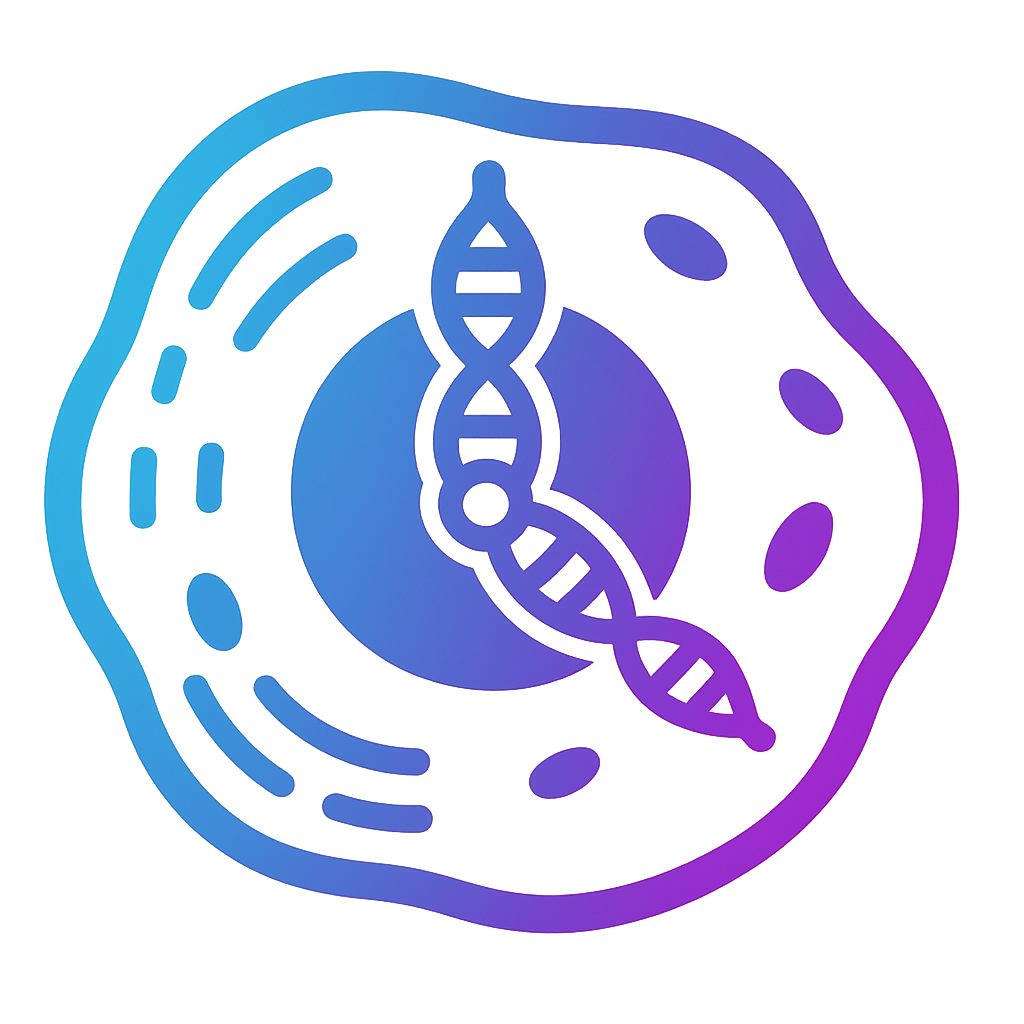
Journey Into the Biology of Time
I’ve been asking the same question for a long time:
Why do we age, and can we fight it?
This site is my way of chasing the answers and sharing the tools, insights, and science I find along the way.

Journey Into the Biology of Time
I’ve been asking the same question for a long time:
Why do we age, and can we fight it?
This site is my way of chasing the answers and sharing the tools, insights, and science I find along the way.
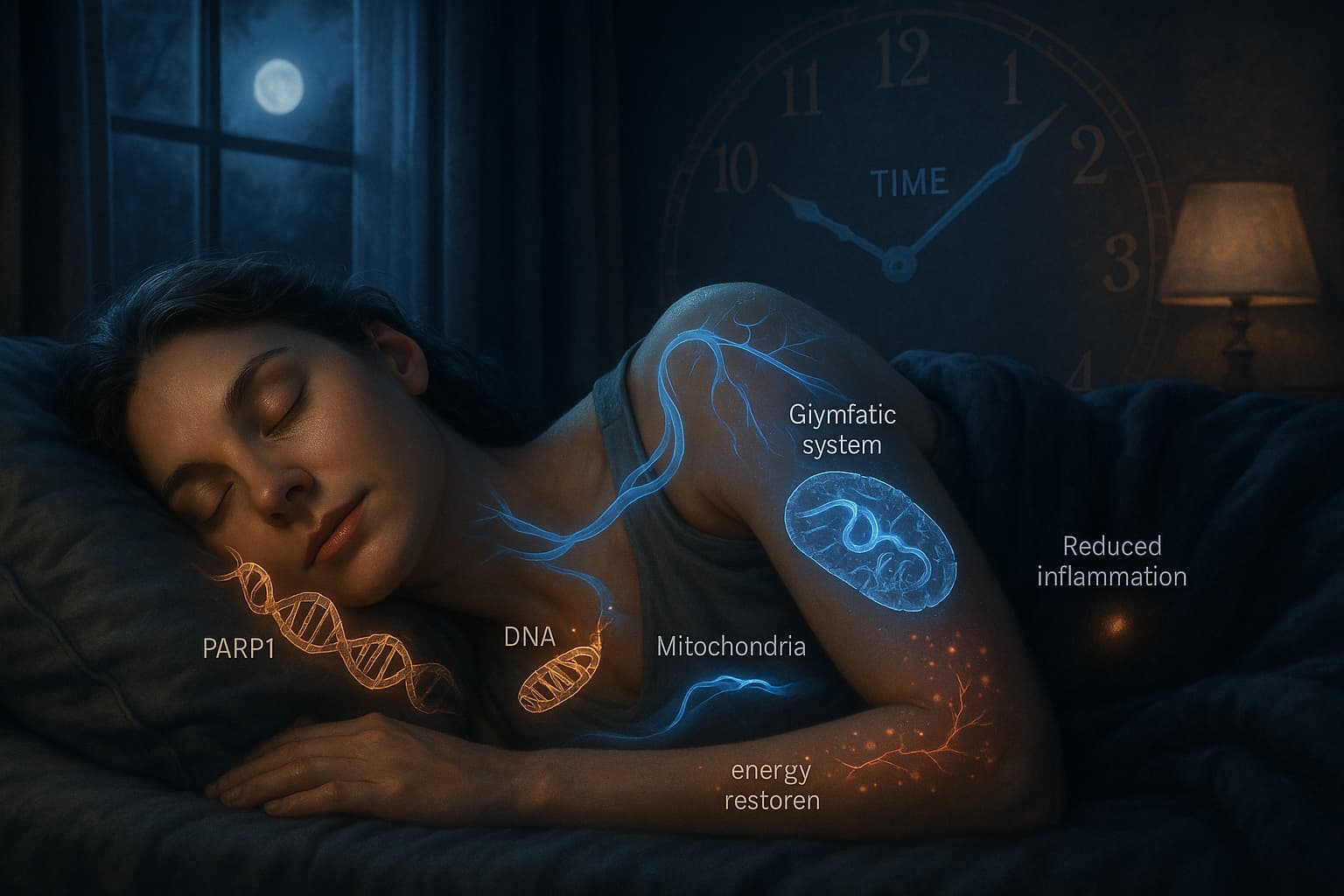
“Sleep is the golden chain that ties health and our bodies together.” — Thomas Dekker
Hey there, night-time biohacker.
If you have ever wondered how much deep sleep do you need, you are asking one of the most important health questions there is. Alongside healthy sleep habits and knowing the best time to sleep, getting enough deep, restorative rest may be one of the most powerful ways to slow aging and protect long-term health.
We are not just talking about counting hours or guessing how many hours of sleep do I need. The real key is making sure your nights include plenty of slow-wave, body-and-brain-repairing rest. This is when your memory is consolidated, your mitochondria are restored, and your cells perform deep maintenance work that supports vitality at every age.
Miss out on deep sleep and you may notice more than just morning grogginess. Without regular sleep tips for better health and the right evening habits, DNA repair slows, inflammation rises, hormones fall out of sync, and the brain’s waste-clearing systems start falling behind. In short, deep sleep is not just rest — it is your body’s nightly reset button.
So how much deep sleep do you really need, and how can you develop healthy sleep habits that guarantee you get it? Let’s dive in.
Description for this block. Use this space for describing your block. Any text will do. Description for this block. You can use this space for describing your block.
If you want to know how much deep sleep do you need, you first need to understand what makes this stage so biologically special. Deep sleep, or slow-wave sleep, is not just a quieter version of being awake. It is a complete shift in the body’s operating mode, like closing the shop to customers so the maintenance crew can move freely through every corner.
During the day, your cells are busy running your body’s “business operations” such as producing energy, processing nutrients, and firing nerve signals. At night, when you enter deep sleep, your brain’s control centers signal a hormonal shift that lowers adrenaline and cortisol while increasing melatonin and growth hormone.
This calmer chemical environment is the cue for DNA repair enzymes, such as PARP1 and DNA ligase, to begin their work. Picture these enzymes as master mechanics who need a quiet garage to repair the damaged machinery of life. In deep sleep, they scan DNA strands for breaks, mutations, and oxidative lesions caused by UV light, toxins, and metabolic stress. These fixes are crucial because persistent DNA damage is a central hallmark of aging known as genomic instability. When left unrepaired, it contributes to other hall marks of aging like cellular senescence and loss of proteostasis.
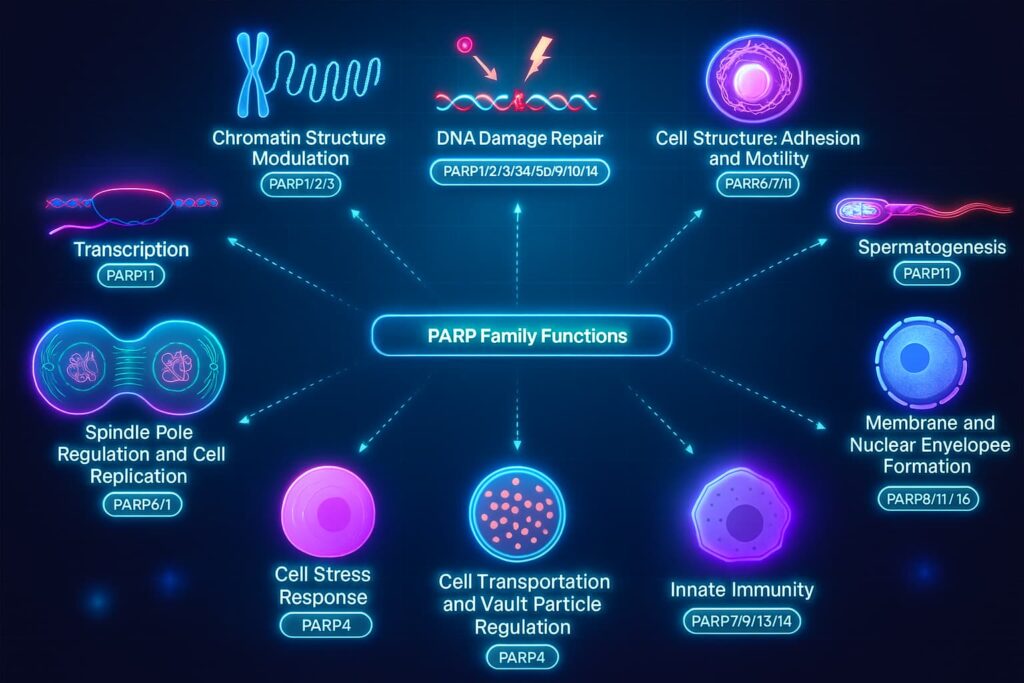
The brain’s glymphatic system is like a night-time cleaning crew that needs clear streets before rolling in with its fluid-filled trucks. During deep sleep, neurons temporarily shrink, opening up extra space between cells. Cerebrospinal fluid then washes through the brain, flushing out waste products such as beta-amyloid and tau proteins. These proteins are linked to neurodegeneration, which connects directly to the hallmark of aging known as altered intercellular communication and, over time, to cognitive decline.
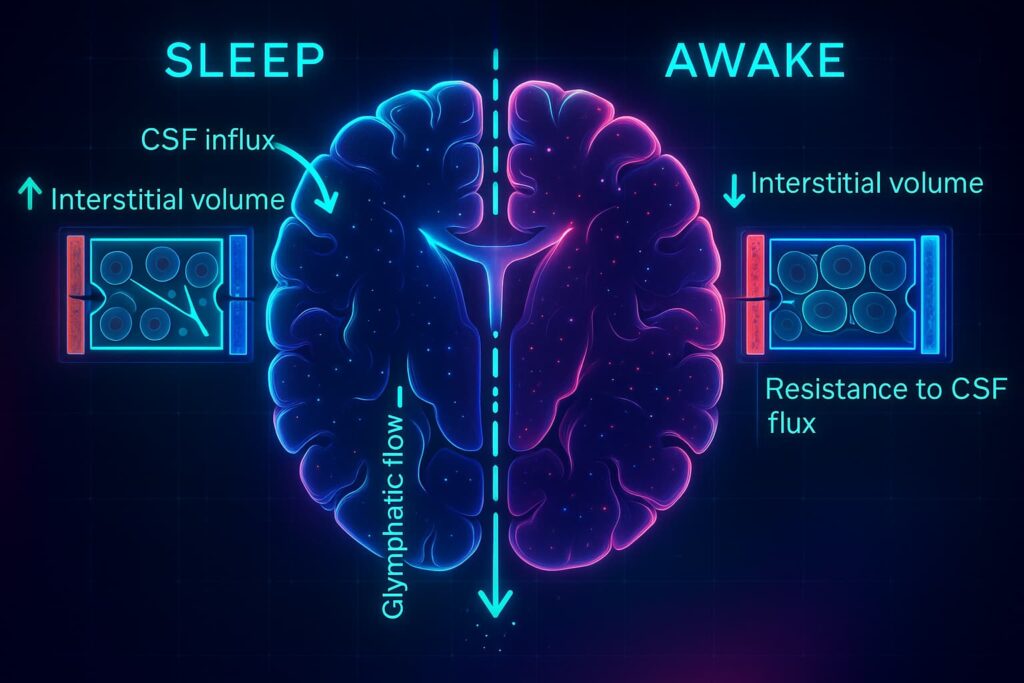
Growth hormone, your body’s main signal for tissue repair, collagen synthesis, and muscle building, is released in powerful pulses during deep sleep. This happens because the hypothalamus and pituitary gland sense the reduced activity of your nervous system and send a “go” signal for rebuilding. Growth hormone supports mitochondrial health, indirectly protecting against the hallmark of aging called mitochondrial dysfunction, and helps maintain tissue structure, countering stem cell exhaustion.
Your immune system uses deep sleep to shift from active defense mode to a recalibration phase. During the day, immune patrols create low-grade inflammation while scanning for threats. At night, deep sleep tilts the balance toward anti-inflammatory cytokines and quiets the pro-inflammatory ones like IL-6 and TNF-alpha. This is why healthy sleep habits directly protect against chronic inflammation, another key contributor that accelerates several hall marks of aging, including dysbiosis and tissue degeneration.
Cutting short your nights is not just about feeling groggy or reaching for an extra coffee. Missing out on deep sleep triggers a biological chain reaction that speeds up several hall marks of aging at the same time. If you have ever asked yourself how much deep sleep do you need or wondered how many hours of sleep do I need, the answer becomes clear here. Not getting enough robs your body of some of its most important repair time and is a signal to review your healthy sleep habits and stick to your best time to sleep.
Without enough slow-wave sleep, the body misses its prime repair window. Genomic instability worsens because DNA repair enzymes get less time to patch strand breaks and oxidative lesions. Over weeks and months, this unrepaired DNA damage can push cells into cellular senescence, where they stop dividing but continue sending inflammatory signals. Following healthy sleep habits and keeping a consistent best time to sleep are critical for giving these repair systems the hours they need.
Deep sleep is when mitochondria restore their membranes, rebalance calcium, and fine-tune energy production. Sleep loss interrupts this process, leading to mitochondrial dysfunction. With less energy available, tissues recover slower, muscles weaken, and the brain becomes more prone to fatigue and fog. This is why sleep tips for better health often include protecting deep sleep because your energy factories depend on it.
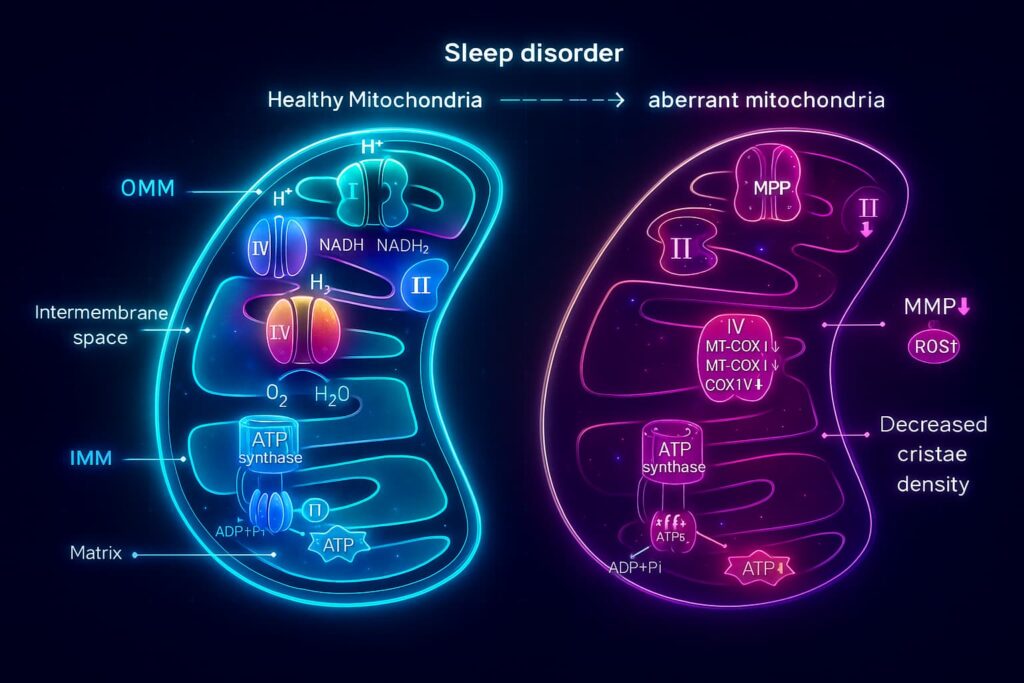
Sleep deprivation raises pro-inflammatory cytokines and weakens immune regulation. This persistent inflammation, known as chronic inflammation or inflammaging, accelerates damage to blood vessels, the gut microbiome, and connective tissues. It can worsen dysbiosis, the imbalance in gut bacteria that affects metabolism and immune health. Knowing how many hours of sleep do I need and sticking to that amount helps control inflammation before it spirals.
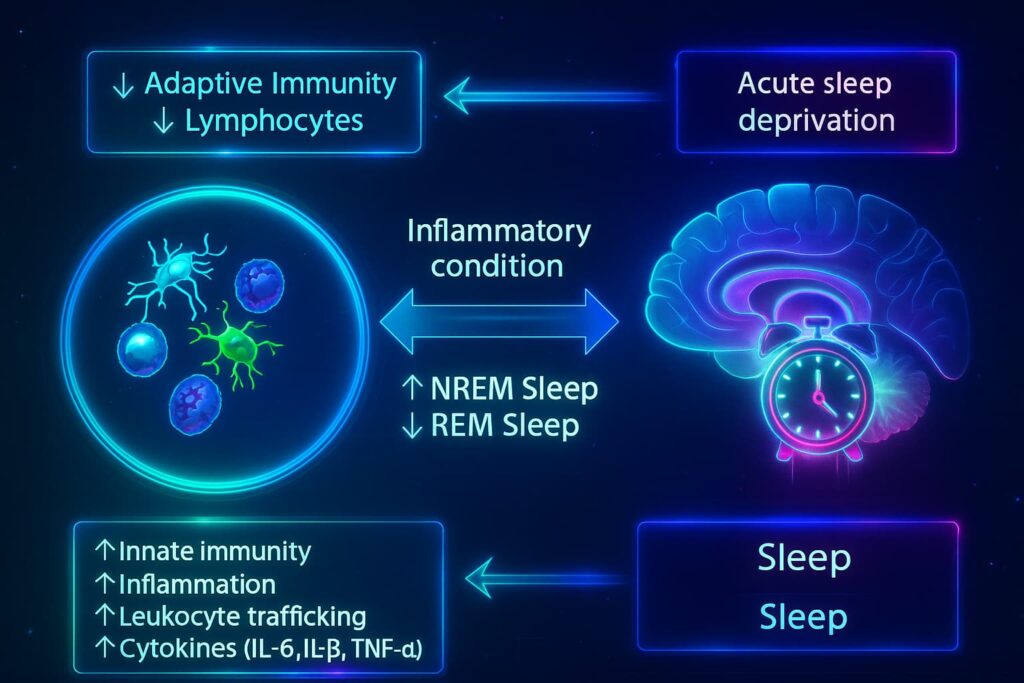
Growth hormone release is cut short, reducing collagen synthesis, muscle repair, and fat metabolism. This hormonal disruption contributes to stem cell exhaustion since the repair signals that keep stem cells active are weakened. Maintaining a regular best time to sleep is one of the most effective healthy sleep habits for keeping these hormone pulses strong.
With less time in deep sleep, the glymphatic system cannot fully clear beta-amyloid and tau proteins. Over years, this leads to altered brain communication patterns, tying into the hallmark of aging called altered intercellular communication. The result is a higher risk for cognitive decline and neurodegenerative disease. Sleep tips for better health often emphasize deep sleep because it is the stage where this brain cleansing is most active.
In short, missing deep sleep is like skipping nightly maintenance on a complex machine. At first it still runs, but the hidden wear accelerates until the breakdowns are impossible to ignore.
Deep sleep is like the premium maintenance package for your body and brain. In youth, you get the full service every night, but with age, that package often gets cut back. Many people in their 60s or 70s spend half as much time in deep sleep as they did in their 20s. This drop is not because the body no longer needs deep sleep. It is because several systems that regulate it begin to weaken, and the loss of deep sleep then worsens those same systems, creating a self-reinforcing cycle. If you know how much deep sleep do you need and stick to healthy sleep habits, you can help slow this decline.
The suprachiasmatic nucleus (SCN) in the hypothalamus is your body’s master clock. It responds to light cues, setting daily rhythms for hormones, temperature, and sleep stages. With age, the SCN becomes less sensitive to these cues, often due to changes in the retina and optic nerve. This blurs the timing of deep sleep cycles, starting them later and ending them earlier. Less deep sleep then disrupts the SCN’s own regulation, making it even harder to maintain strong circadian rhythms. Following a fixed best time to sleep can help keep this clock on track.
The pineal gland produces melatonin, the hormone that signals the body to wind down for rest. As we age, melatonin production drops, partly because of pineal gland calcification and weaker SCN stimulation. This shortens the time spent in slow-wave sleep. At the same time, reduced deep sleep lowers melatonin’s antioxidant protection, leaving more oxidative stress in cells, which further damages the pineal gland and melatonin pathways. Sleep tips for better health often include reducing light exposure at night to keep melatonin levels strong.
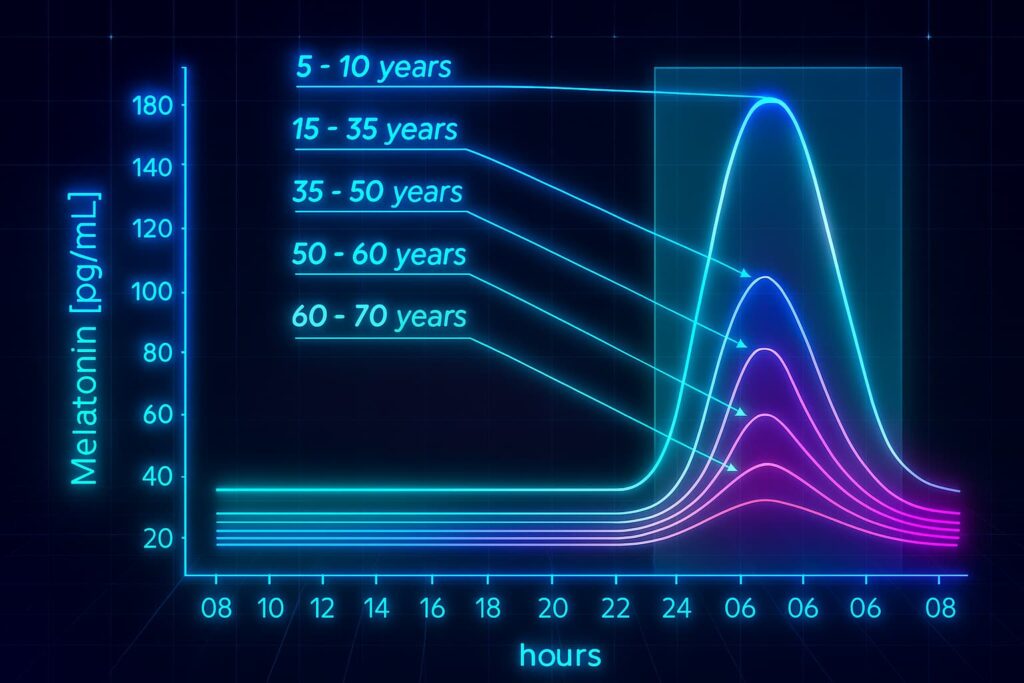
Deep sleep is defined by slow, high-amplitude brain waves between the thalamus and cerebral cortex. These slow waves open the door for DNA repair, mitochondrial renewal, and waste clearance. Age-related changes in brain structure weaken this wave activity, making deep sleep shallower and shorter. Less deep sleep means fewer restorative slow waves, which accelerates neuronal wear, further weakening the brain’s ability to produce deep sleep in the future. This is why how many hours of sleep do I need becomes an even more important question with age.
Older adults often wake more often during the night due to lighter sleep, bladder changes, pain, or conditions like sleep apnea. Each awakening interrupts ongoing repair processes. Over time, fragmented deep sleep increases inflammation, impairs hormone balance, and disrupts the nervous system, all of which increase the likelihood of more nighttime awakenings. Using healthy sleep habits to reduce interruptions can protect your deep sleep cycles.
Aging is associated with higher chronic inflammation and changes in key hormones like cortisol and growth hormone. High evening cortisol delays deep sleep onset, while reduced growth hormone limits tissue repair. Missing deep sleep then fuels more inflammation and further weakens growth hormone release, deepening the cycle. Sticking to your best time to sleep and following sleep tips for better health can help reduce these effects.
The same biological changes that reduce deep sleep, including circadian rhythm disruption, lower melatonin, weaker slow-wave activity, inflammation, and hormonal decline, are also worsened by a lack of deep sleep. This feedback loop feeds directly into the hall marks of aging. Less deep sleep increases genomic instability, mitochondrial dysfunction, loss of proteostasis, chronic inflammation, and altered intercellular communication. In turn, these hallmarks make it harder for the brain and body to generate restorative deep sleep, creating a vicious cycle that speeds up biological aging.
The takeaway is simple. Protecting deep sleep is not just about getting more rest. It is about breaking this cycle so that the systems that keep you healthy and youthful can continue to function at their best.
Knowing how much deep sleep do you need is only half the story. The real challenge is getting it night after night so your body can switch into repair mode, recharge its systems, and defend itself against the hall marks of aging. Think of deep sleep as the night shift in your body’s factory, the time when the cleaning crews, mechanics, and engineers come in to fix what the day wore down. Here is how to make sure they get the job done.
Your circadian rhythm is like the factory’s schedule. It is run by a master clock in your brain called the suprachiasmatic nucleus, which takes its cues from light and dark. When you go to bed and wake up at the same times every day, you are giving the night crew a predictable shift start. That predictability lets your repair enzymes, think of them as skilled DNA mechanics, work at full capacity patching strand breaks and scrubbing away chemical smudges that cause genomic instability and cellular senescence. Change your schedule too often and it is like asking those mechanics to show up to a shop that is randomly locked or open.
Melatonin is both a sleep signal and a bodyguard for your cells. It only shows up in the dark, and when it does, it patrols your DNA like a security guard, neutralizing dangerous reactive oxygen species before they can cause DNA damage. Even a little light at night is like shining a flashlight in the guard’s eyes, confusing him and slowing his rounds. A pitch-black room keeps melatonin on duty, helping protect your genetic blueprint while you sleep.
As bedtime approaches, your core body temperature naturally drops, a signal to your brain that it is time to start deep repair. A cooler bedroom acts like air-conditioning for your internal factory, letting the machinery slow down so the repair crews can get in safely. In this cooler state, your mitochondria, the power plants of your cells, can repair their wiring, replace damaged parts through mitophagy, and prevent the mitochondrial dysfunction that leaves you feeling sluggish and aged.
Your digestive system is like the factory floor during business hours, full of forklifts, moving crates, and active workers. If you eat a big meal right before bed, those forklifts are still running when the repair team arrives. Waiting 2–3 hours after your last meal lets the floor clear so autophagy, the body’s waste recycling department, can start dismantling old, damaged proteins. This is key for preventing loss of proteostasis, the buildup of faulty proteins that gunk up cellular machinery.
Caffeine is like a stubborn customer who will not leave the store, keeping the lights on and the night crew waiting. It blocks adenosine, the chemical that tells your brain you are ready for rest. Alcohol may usher you into sleep, but it makes the repair crew clumsy, causing them to skip steps and break things, fragmenting deep sleep. The result is lower growth hormone release, slower muscle and tissue repair, and a faster march toward stem cell exhaustion and chronic inflammation.
Cortisol, your main stress hormone, is like a blaring fire alarm in the factory. If it is still sounding, the repair crews cannot focus. Stress before bed keeps your nervous system in “fight” mode, blocking deep sleep and flooding your body with inflammatory messengers. Calming activities such as deep breathing, reading, or gentle stretching turn off the alarm, letting your immune system recalibrate and reducing altered intercellular communication caused by stress.
Think of magnesium, L-theanine, and glycine as better tools for your night shift workers. Magnesium relaxes tense muscles and calms nerve activity, L-theanine creates a steady mental state, and glycine cools the body and improves deep sleep quality. With the right tools and a good healthy sleep habits foundation, your brain’s glymphatic system can run at full power, flushing out toxic proteins and leaving your mental factory spotless for the next day.
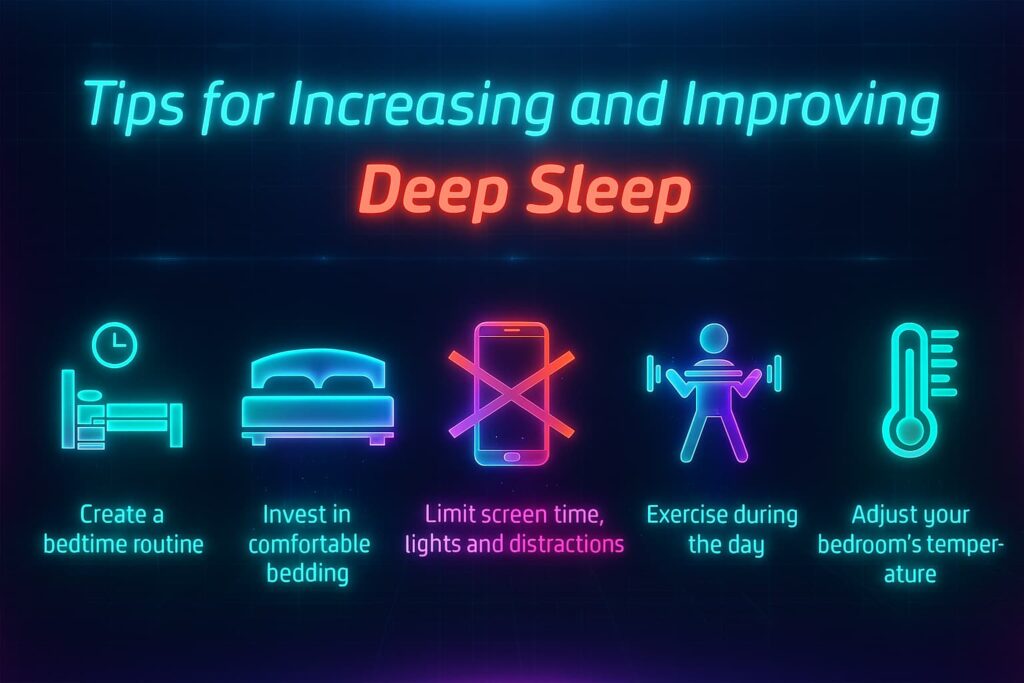
If you have ever asked yourself how much deep sleep do you need, the answer is simple: enough to let your body’s night shift finish its work. Deep sleep is not just a time of rest, it is when your DNA repair crews restore genomic stability, your mitochondria recharge, your immune system recalibrates, and your brain’s cleaning system washes away waste.
Neglect it and you accelerate multiple hall marks of aging at once, from genomic instability and cellular senescence to mitochondrial dysfunction, chronic inflammation, and altered intercellular communication. Protect it and you give your body the time and conditions it needs to slow the biological clock.
The beauty of deep sleep is that it is free, available every night, and completely under your control. Whether you are fine-tuning your healthy sleep habits, adjusting your bedtime, or following sleep tips for better health, the payoff is a body and mind that wake up younger than when you went to bed.
So tonight, think of your bedroom as a high-tech repair bay, your bed as the workstation, and yourself as the priceless machine getting a full overhaul. Give your night crew the tools, the time, and the peace they need, and they will keep you running strong for decades to come.